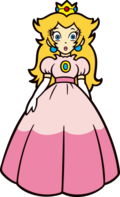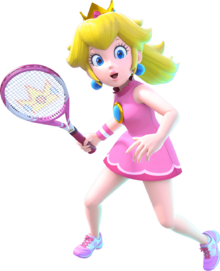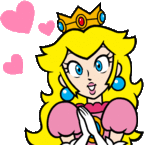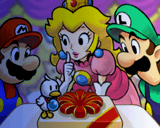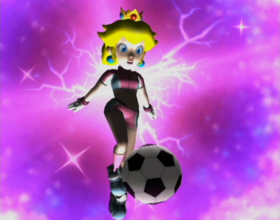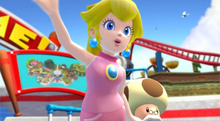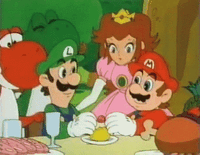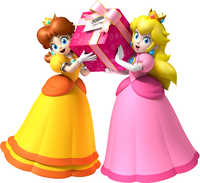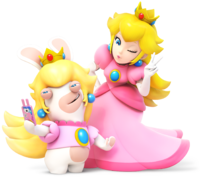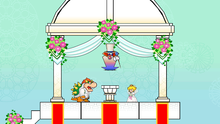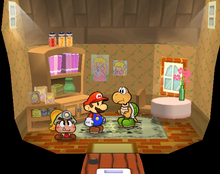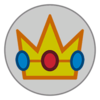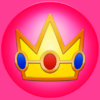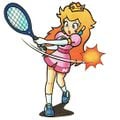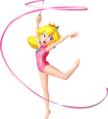Princess Peach: Difference between revisions
ThunderBrine (talk | contribs) (→Name) |
ThunderBrine (talk | contribs) (→Name) |
||
| Line 24: | Line 24: | ||
====Name==== | ====Name==== | ||
Miyamoto came up with her name by associating princesses with girls, girls with the color pink, and pink with peaches.<ref>{{cite|language=jp|url=www.ndw.jp/mario-220913-2|title="Shigeru Miyamoto on the origin of the names of Mario and his friends"|publisher=[[Nintendo DREAM]]|date=February 2010|accessdate=May 19, 2024}} <small>Note: The Japanese word for pink (桃色, ''momoiro'') literally means "peach-colored."</small></ref>In Japan, her name has always been Princess Peach, written in Romaji (ピーチ・姫 ''Pīchi-hime'' | Miyamoto came up with her name by associating princesses with girls, girls with the color pink, and pink with peaches.<ref>{{cite|language=jp|url=www.ndw.jp/mario-220913-2|title="Shigeru Miyamoto on the origin of the names of Mario and his friends"|publisher=[[Nintendo DREAM]]|date=February 2010|accessdate=May 19, 2024}} <small>Note: The Japanese word for pink (桃色, ''momoiro'') literally means "peach-colored."</small></ref>In Japan, her name has always been Princess Peach, written in Romaji (ピーチ・姫 ''Pīchi-hime''), but in the West, she was originally known as "Princess Toadstool", due to [[Nintendo of America]] renaming her when localizing ''Super Mario Bros.'', feeling that "Peach" was irrelevant to the theme of the Mushroom Kingdom.<ref>{{cite|author=Gaming Historian|date=September 30, 2021|url=www.youtube.com/watch?v=aTyxQfpOEbE&t=482s|title=How the Mario Characters Got Their Names|timestamp=08:02|publisher=YouTube|accessdate=May 19, 2024}}</ref> | ||
Her name when translated into Japanese is normally ピーチ・姫 (''Pīchi-hime''), not to be confused with 桃・姫 (''Momo-hime'' lit. Peach Princess). However, the other translation as プリンセスピーチ (''Purinsesu Pīchi'') only officially exists in the Japanese titles of the games ''[[Super Princess Peach]]'' and ''[[Princess Peach: Showtime!]]'' as well as in the Japanese name of [[The Princess Peach]] from ''[[Paper Mario: The Origami King]]''. | In 1993, the English version of ''[[Yoshi's Safari]]'' marked the first time that the name "Princess Peach" was used outside of Japan; however, the name did not become standardized until ''[[Super Mario 64]]''. Games as of ''[[Mario Kart 64]]'' use Peach as her prominent name. Certain contemporary sources reconcile the two names by listing her full name as "Peach Toadstool", including subsequent re-releases of ''Super Mario 64'', such as the international, Shindō Pak Taiō Version and [[Super Mario 64 DS|the DS remake]], which had the princess signing her letter using both "Toadstool" and "Peach".<ref name=SM64guide/> For the most part, however, the "Toadstool" name is hardly used outside of remakes and re-releases of older titles, which most times retain the original localized text. She, along with her Toad subjects, is the only major character that no longer uses her original localized name. However, ''[[Super Smash Bros. for Wii U]]'' refers to "Princess Toadstool" as a name Peach went by in one of the in-game tips, and in the North American version her title on the [[Boxing Ring]] stage is "Princess of Toadstools". On a similar note, although she was mostly referred to as Princess Toadstool in various countries outside the United States in most localizations (or "Princess Mushroom" in some cases), the Danish dub for ''The Adventures of Super Mario Bros. 3'' had changed her name to Prinsesse Slørhat, which translated to "Princess Cortinarius", referring to a genus of poisonous mushrooms. Likewise, the Italian dub for the entire DIC cartoon line also referred to her as "Principessa Amarena" or "Princess Cherry". | ||
Her name when translated into Japanese is normally ピーチ・姫 (''Pīchi-hime'' lit. Pīchi Princess), not to be confused with 桃・姫 (''Momo-hime'' lit. Peach Princess). However, the other translation as プリンセスピーチ (''Purinsesu Pīchi'') only officially exists in the Japanese titles of the games ''[[Super Princess Peach]]'' and ''[[Princess Peach: Showtime!]]'' as well as in the Japanese name of [[The Princess Peach]] from ''[[Paper Mario: The Origami King]]''. | |||
==History== | ==History== | ||
Revision as of 20:20, December 27, 2024
- This article is about the damsel-in-distress of the Super Mario series. For the cruise ship named after her in Paper Mario: The Origami King, see The Princess Peach. For her infant counterpart, see Baby Peach.
- "Peach" redirects here. For other uses, see Peach (disambiguation).
| Princess Peach | |
|---|---|
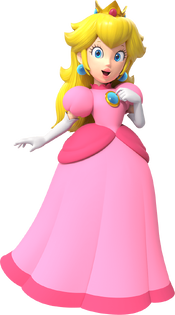 Artwork from Super Mario Party Jamboree | |
| Full name | Princess Peach Toadstool[1][2][3] |
| Species | Human |
| First appearance | Super Mario Bros. (1985) |
| Latest appearance | Mario & Luigi: Brothership (2024) |
| Latest portrayal | Samantha Kelly (2007–present) |
- “Oh dear... Here we go again... I can't believe I'm kidnapped again. Everyone must be worried sick. Again.”
- —Princess Peach, Paper Mario: The Thousand-Year Door (Nintendo Switch)
Princess Peach (casually Peach, usually known as Princess Toadstool outside Japan prior to Yoshi's Safari) is a major character in the Super Mario franchise, the princess of the Mushroom Kingdom, and the love interest of Mario. She first appeared in Super Mario Bros. and was created by Shigeru Miyamoto to be the damsel-in-distress throughout most Super Mario games. She resides in her castle along with many Toads, who act as her loyal servants. Her kingdom is often attacked by Bowser and his minions.
Peach has an affinity for the color pink, which accents her gentle personality and kind temperament. Peach's kind nature and role as the damsel in distress are often represented with her heart abilities and crown emblem.
Since her debut, Peach has appeared in several Super Mario games spanning the course of decades, even appearing in more games than any other female character in video game history. Peach is occasionally a supporting character in mainstream games and she is almost always playable in spin-off installments. Her lead roles are in Super Princess Peach and Princess Peach: Showtime!
Creation and development
Design
Peach's initial design was said to represent her stubborn yet cute appearance.[4] Peach's initial design had been conceived by Shigeru Miyamoto, with some of his suggestions to Yoichi Kotabe being incorporated into the final design, in particular making her eyes look more "cat-like."[5] Before Kotabe conceived Peach's finalized character design, a couple of prototype designs were created for the character. One such design, seen on the Super Mario Bros. Japanese box art, depicts her with a long-sleeved dress, no gloves, strawberry-blonde hair, and crown jewels that were white instead of red and blue. Another prototype, seen in the 1985 Japanese strategy guide How to win at Super Mario Bros., portrays her as a Toad rather than as a human, having a mushroom cap instead of natural hair, as well as a simple tiara and a gown reminiscent of Aurora from Disney's Sleeping Beauty, whom she somewhat currently resembles.
Peach has always been depicted as a blonde in video game artwork, although it was originally a darker, more strawberry-blonde shade (or in the case of the Japanese packaging, a dark blonde shade). However, due to the graphical limitations of the Family Computer and Family Computer Disk System hardware (including the Western Nintendo Entertainment System), Peach's on-screen sprite in the earlier Super Mario Bros. games displayed her with reddish-brown hair, and as a result, she was depicted as a redhead in the DiC Entertainment cartoons, as well as reddish-brown in Mario-related merchandise such as a 1988 toy box artwork. Starting with Super Mario World for the SNES, her in-game appearances had her proper hair color. On a similar note, her dress had always been depicted as pink in video game artwork, although because of the aforementioned graphical limitations, Peach's on-screen sprite in Super Mario Bros. and Super Mario Bros.: The Lost Levels depicted her as wearing a white dress with red highlights; this depiction of her old dress would later be reused for her Fire form in Super Mario 3D World. She only gained a pink dress in-game starting with the overseas version of Super Mario Bros 2. Peach's classic main dress had a normal pink high collar, a sash around the waist instead of panniers, and was darker pink from the hem to her knees, but otherwise does not differ greatly from the modern/current main dress introduced with the GameCube-era games, starting with Super Mario Sunshine and Mario Party 4, although the subsequent Paper Mario: The Thousand-Year Door installment marked the original dress's final appearance, with it being retained for the Nintendo Switch remake as well. Although the key artwork featured Peach in the Japanese versions of Super Mario Bros., the instruction manuals for both the Famicom and NES versions of the game hid her sprite behind a question mark in order to keep her identity a surprise for players as a way to motivate them into completing the game.
Name
Miyamoto came up with her name by associating princesses with girls, girls with the color pink, and pink with peaches.[6]In Japan, her name has always been Princess Peach, written in Romaji (ピーチ・姫 Pīchi-hime), but in the West, she was originally known as "Princess Toadstool", due to Nintendo of America renaming her when localizing Super Mario Bros., feeling that "Peach" was irrelevant to the theme of the Mushroom Kingdom.[7]
In 1993, the English version of Yoshi's Safari marked the first time that the name "Princess Peach" was used outside of Japan; however, the name did not become standardized until Super Mario 64. Games as of Mario Kart 64 use Peach as her prominent name. Certain contemporary sources reconcile the two names by listing her full name as "Peach Toadstool", including subsequent re-releases of Super Mario 64, such as the international, Shindō Pak Taiō Version and the DS remake, which had the princess signing her letter using both "Toadstool" and "Peach".[2] For the most part, however, the "Toadstool" name is hardly used outside of remakes and re-releases of older titles, which most times retain the original localized text. She, along with her Toad subjects, is the only major character that no longer uses her original localized name. However, Super Smash Bros. for Wii U refers to "Princess Toadstool" as a name Peach went by in one of the in-game tips, and in the North American version her title on the Boxing Ring stage is "Princess of Toadstools". On a similar note, although she was mostly referred to as Princess Toadstool in various countries outside the United States in most localizations (or "Princess Mushroom" in some cases), the Danish dub for The Adventures of Super Mario Bros. 3 had changed her name to Prinsesse Slørhat, which translated to "Princess Cortinarius", referring to a genus of poisonous mushrooms. Likewise, the Italian dub for the entire DIC cartoon line also referred to her as "Principessa Amarena" or "Princess Cherry".
Her name when translated into Japanese is normally ピーチ・姫 (Pīchi-hime lit. Pīchi Princess), not to be confused with 桃・姫 (Momo-hime lit. Peach Princess). However, the other translation as プリンセスピーチ (Purinsesu Pīchi) only officially exists in the Japanese titles of the games Super Princess Peach and Princess Peach: Showtime! as well as in the Japanese name of The Princess Peach from Paper Mario: The Origami King.
History
- Main article: History of Princess Peach
Following a frequent role of being the damsel-of-distress kidnapped by Bowser, Princess Peach has appeared in almost every single piece of Super Mario media from the very start. Her first appearance, chronologically, is in Yoshi's Island DS as one of the seven star children. Though Peach has the role of being held captive by Bowser, she is also seen allying with him as shown in several spin-off series. As with Mario, Peach can be seen in a wide bevy of cameos, even outside her own franchise.
Appearance
Physical description
Peach is a young woman with long blonde hair, fair skin and blue eyes, framed by six lashes (three or four in other artwork) and small, thin eyebrows. She has an oval face with a pointed chin, a triangular nose and full pink lips. Her hair has a triangular bang in the center of her forehead, two rows of flips on her back, and two split sideburns framing her face. Due to her lithe and slim figure, she is classified as lighter weight than Mario or Luigi in various games such as in the Mario Kart series despite being taller than them.
Peach usually wears a pink floor-length dress with puffy sleeves, magenta panniers at the waist, a high collar and a frill of the same color at the hem. Most games include a white petticoat under her dress. From Super Mario Bros. to Mario Kart: Super Circuit, her dress had a band around her waist rather than panniers and was colored magenta from below her knees. This appearance was brought back in Paper Mario: The Thousand-Year Door and its remake. Peach wears a golden crown with red and blue gems, round blue earrings, and an oval blue brooch on her chest. She wears long white opera gloves and red high heels. In Princess Peach: Showtime!, princess seams are added to the bodice. Her dress is far more elaborately designed in recent Super Smash Bros. titles, as well as Super Smash Bros. Melee giving her dress an original design, but is otherwise the same; the Super Smash Bros. games have also given her minor proportion changes such as the size of her head and the thickness of her eyelashes.
Peach is usually depicted as taller than most human characters, exceeded only by Rosalina, Pauline, and Waluigi. In the pamphlet for Super Mario Bros.: Peach-hime Kyūshutsu Dai Sakusen!, her height is given as 160 cm (5 ft 3 in.) and her weight as 41 kg (90 lbs.)[8] In the original and Super Mario Bros. Deluxe versions of Super Mario Bros. and Super Mario Bros.: The Lost Levels, however, she is depicted as being shorter than Super Mario/Super Luigi (with the difference in size being enough that she has to stand on her tip-toes to kiss Mario/Luigi if they are in Super/Fire form in the Deluxe version). However, in the Deluxe version, there are full scenes with Peach lowering herself to make eye contact with Mario while being eye-level with Luigi. In Super Mario Bros. Wonder, Super Mario and Super Peach are now depicted as approximately the same height, with Super Luigi being taller.
Though no fixed age has been revealed for Peach in the video games, Mario & Luigi: Partners in Time indicates that she is at least just slightly younger than Mario and Luigi, being the only one of the three to have not yet developed proper motor or speech skills as a baby. Taking into consideration the statement that Mario and Luigi are between their early and mid twenties, a relatively wider and more exact age gap is present in early animated media; the pamphlet for Super Mario Bros.: Peach-hime Kyūshutsu Dai Sakusen! states her age as 16 (compared to Mario and Luigi, who are respectively stated to be around 25 and 23),[8][9] while the writers' bible for The Adventures of Super Mario Bros. 3 states that the DIC cartoons' version of the princess is 17.[10]
Alternate outfits
Princess Peach has been in various outfits, most frequently in the sports games. In Mario Golf and Mario Tennis for the Nintendo 64, Peach's sports dress was simply a shorter, sleeveless version of her usual dress. Starting with the GameCube Mario sports games, however, her outfits have more variety. In Mario Golf: Toadstool Tour and Mario Power Tennis, the outfit that she wears is a sleeveless minidress. In other traditional active sports installments such as Mario Hoops 3-on-3, the Mario Baseball games, and Mario Sports Mix, her outfit consists of a two-piece athletic uniform. She has received different sports outfits in some games such as Mario & Sonic at the Olympic Games Tokyo 2020, where she has different clothes to suit each sport ranging from surf wear to jockey apparel to leotards, and the Mario Strikers games, where she wears armor to fit the more physical nature of the games.
In Mario Kart Wii and Mario Kart 8 / Mario Kart 8 Deluxe, Peach wears a pink jumpsuit when riding motorbikes and ATVs. This jumpsuit is also seen in The Super Mario Bros. Movie.
Outside of sports, Peach occasionally changes her outfit to fit the occasion. In Mario Party 2, she wears five distinct outfits fitting into five of the six themes for Mario Land, as Bowser Land has the characters in their original clothes. In Super Mario Sunshine, Peach wears a lighter, sleeveless version of her dress and a hair in a ponytail; she wears a ponytail in subsequent Mario Kart games, starting with Mario Kart: Double Dash!!, and various sports games. In Super Mario Odyssey, aside from her traditional pink dress, which only appears in the prologue and when encountering her at Mushroom Kingdom in the post-game, she has a wide variety of outfits, such as the wedding dress she wore for most of the game, as well as various outfits she wore in the post-game, with the specific type depending on the world visited. Most of these outfits have reappeared as high-tier rewards in Mario Kart Tour.
In Princess Peach: Showtime!, Peach has 12 different costumes she can transform into: Swordfighter, Detective, Patissiere, Kung Fu, Ninja, Cowgirl, Figure Skater, Dashing Thief, Mermaid, Mighty, Radiant and Super Radiant.
In certain games where multiple players can play as Peach, such as the Super Smash Bros. series, Princess Peach comes in several alternate colors, usually changing her clothing, but she has a Princess Daisy palette in Super Smash Bros. Melee that even changes her hair color and complexion.
Peach has also worn alternate outfits in promotions. One of the earliest was Peach in a kimono in All Night Nippon: Super Mario Bros. to promote Japanese holiday. Although this particular outfit has not appeared in any games since, Peach wore similar kimono outfits in an advertisement for Nintendo's involvement in the Kyoto Cross Media Experience 2009, a Club Nintendo calendar award, a New Year 2017 wallpaper (which was reused from artwork from the Kyoto Cross Media Experience 2009), in Bowser's Kingdom in Super Mario Odyssey, and as a driver variant in Mario Kart Tour (as well as a pink yukata partly derived from her Bowser's Kingdom attire).
General information
Personality
Peach is shown to be a sweet, kind, polite, and optimistic person, while also being classy and sociable, with more and more portrayals further displaying her as clever and adventurous. She apologizes excessively for getting into trouble and requiring Mario to rescue her. She even shows concern and compassion towards her enemies frequently such as saving Mimi in Super Paper Mario or making a thank-you cake for Bowser in Mario & Luigi's Bowser Inside Story, even after Mario and Luigi defeat Bowser in a fight that Bowser started. She can sometimes be assertive when it comes to standing up for her friends; she managed to outright resist Nastasia's mind control abilities during the "wedding" in Super Paper Mario, which Nastasia indicated was unprecedented. In Paper Mario: The Thousand-Year Door, she manages to resist Shadow Queen's possession long enough to not only offer words of encouragement to Mario and his party, but also heal them (with the Shadow Queen, due to possessing Peach's body, being forced to go along with it). Her innate characteristics are often key to the plot of several games, such as her abilities to activate the Beanstar and Dark Star.
Largely because of her frequency of being kidnapped, she has been the subject of a running gag in throughout the series where several characters refer to the frequency of her abductions. Even Peach herself has referred to her kidnapping in New Super Mario Bros. Wii as a "recent kidnapping". Some characters referred to her even being useless, such as Snake in Super Smash Bros. Brawl and Pit (and to a certain extent, Viridi) in Super Smash Bros. for Nintendo 3DS / Wii U. But while Peach is often considered the archetypal video game damsel in distress, she is often shown actively working against her captors, such as tossing Super Mushrooms to Mario during the final fight in Super Mario World, sneaking around searching for power-ups and/or information to send to Mario in games such as Super Mario Galaxy and the Paper Mario series, and even attempting to escape her confinement in Super Mario 3D Land.
While Peach occasionally seems naïve, she is generally level-headed, knows when to take charge, and shows more common sense and observance than those around her, such as noticing a Mario doppelganger in the Isle Delfino vacation guide video's background in Super Mario Sunshine, insisting that an emergency meeting continues even after it is briefly interrupted by Bowser and deducing what Fawful was planning regarding her in Mario & Luigi: Bowser's Inside Story, and talking a stubborn Bowser into joining her and Mario in Super Paper Mario. She often acts as a peacemaker; for example, in Super Smash Bros. Brawl's story mode, she offers tea to Fox and Sheik in order to stop them from fighting, and later converts Mr. Game & Watch to their cause. In the Super Mario World cartoon, she is a motherly figure to the young Yoshi and Oogtar, and in the cartoons overall, she is practical and generous to a fault, such as trying to convince the Mario Bros. to return home, despite the fact that King Koopa is still after her. She also has a feisty side, which shines through particularly well in her comic appearances. Besides sports, Peach is also into ballroom dancing, video games, and gardening, and seems to enjoy exploring and trying new things.
Although she is generally depicted as kind, sociable, and generous in most games, the Mario Strikers games do show a slightly more arrogant and petulant side to Peach, including her pitching a fit to one of her teammates and eventually jumping in a tantrum if the opposing team scores, while Mario Strikers Charged in particular shows her having a diva-like side, with her being eager to get photographed and striking poses; in Mario Strikers: Battle League, though, she regains her composure. A similar temperamental nature can be observed if the player fails to flip food in time and have it land on the floor in the Modern versions of Chef, where Peach will either stomp her foot in frustration (Game & Watch Gallery 2) or otherwise put her hand over her head and scream repeatedly in frustration before proceeding to wince (Game & Watch Gallery 4), in either case causing Yoshi to crouch down in fear.
In Super Mario Bros. 2, Super Mario RPG: Legend of the Seven Stars, Super Paper Mario, Super Mario 3D World, Super Mario Run, Mario + Rabbids Kingdom Battle, Mario + Rabbids Sparks of Hope, Super Mario Bros. Wonder, and most notably, Super Princess Peach and Princess Peach: Showtime!, Peach shows the braver side of her personality; participating as a fellow heroine, or in the latter two cases, as the sole heroine, single-handedly saving the day.
In The Super Mario Bros. Movie, Peach's personality was drastically revamped. She is considerably more assertive and tomboyish, and a born leader for her kingdom, keeping her role as a caring figure towards the Toads, albeit in a more active way. She is not soft-spoken like her game counterpart but has moments of kindness, as she takes Mario with her to the Jungle Kingdom, despite failing the obstacle course multiple times. Additionally, she reluctantly accepts to Bowser's proposal as Kamek tortures Toad, on the condition that he doesn't hurt her people.
Speech
Early in her history, while Peach did speak, it was largely done via text dialogue. It was not until Mario is Missing where Peach got some dialogue, and it would not be until Super Mario 64 onward that she maintained having voiced dialogue. In Super Mario 64 and the international versions of Mario Kart 64, she largely spoke with a mature, feminine tone, though in the Japanese version of Mario Kart 64 as well as all versions of Mario Party, 2, and 3, and Super Mario Advance, Peach spoke with a slightly higher-pitched, somewhat shrill tone, and also possessing a slight Italian accent in the case of the last game. Starting with Super Smash Bros. Melee and Super Mario Sunshine, she was given a very soft, high-pitched voice. In the Japanese versions of certain games, such as Itadaki Street DS and Fortune Street, Peach tends to end her sentences with "ですわ" (desu wa), a stereotypical trait in Japanese media reserved for noble upper-class women and even simply haughty and arrogant women. In Princess Peach: Showtime!, Peach's voice varies from her usual tone to a deeper one, similar to the one used in her earlier voiced appearances.
Powers and abilities
Like other Super Mario characters, Peach can Jump and Ground Pound; she also slaps opponents, which is her specialty, rather than punching. While not very strong physically, she makes up for it in technique and skill, and many games reveal her to be fast and agile as well. She is also shown to be very graceful, often embellishing attacks and victory scenes alike with elegant movements, twirls, and dances. With the release of Super Mario 3D World, Peach is able to use power-ups, such as the Fire Flower, Super Leaf, Super Bell, and Double Cherry, among other power-ups and items. She also has the unique ability to float in mid-air by means of her skirt, first seen in Super Mario Bros. 2, and can also use her parasol to achieve this same effect. This ability returns in Super Mario 3D World (where it is also revealed that Peach can still glide even when she does not have a skirt on) and the Super Smash Bros. series, and Peach is also shown using it in The Super Mario Bros. Movie. In New Super Mario Bros., New Super Mario Bros. Wii, and New Super Mario Bros. 2, she is shown to be able to slow down her descent from a fairly large height.
In Super Mario RPG: Legend of the Seven Stars Peach is shown to have impressive healing abilities like Therapy and Group Hug, and this ability is seen again in Paper Mario: The Thousand-Year Door when she overcomes the Shadow Queen's mind control over her to heal Mario and his party. She has occasionally been shown to have telepathic powers, like in Super Mario Advance 4: Super Mario Bros. 3, when she calls out to Mario as a hologram in Dark Land, or when she and Starlow combine powers to drain and then send Bowser flying in the beginning if Mario & Luigi: Bowser's Inside Story. Additionally, in Super Smash Bros. Brawl, her Final Smash, Peach Blossom, puts her opponents to sleep. In Super Smash Bros. Melee, Peach has a powerful special attack called the Peach Bomber, where hip-checking her opponents engulfs them in an explosion. Earlier, Super Mario RPG also linked her with explosions, as one of her attacks, Psych Bomb, involved throwing bombs at her opponents, and a similar scene occurred in the Super Mario Adventures comic, when she used a barrage of bombs against the Koopalings. In Mario & Luigi: Bowser's Inside Story, she was also shown to have enough strength to not just telekinetically throw Bowser out of her castle, but throw him far into the forest outside Toad Town. However, it's implied that she was only able to do this with Starlow's help, largely because Starlow had weakened Bowser earlier. She also was powerful enough to counteract Bowser's magic, which was the initial reason why Bowser had abducted her in Super Mario Bros.
In general, however, Peach's special abilities and powers usually involve hearts. They are mostly seen in the sports installments including, but not limited to, Mario Power Tennis (Sweet Kiss Return), Mario Hoops 3-on-3 (Heart Shot), Mario Golf: Toadstool Tour and Super Mario Strikers (heart trails follow the balls after special hits). Her special item in Mario Kart: Double Dash!! is also a heart, and allows her to co-opt others' attacks. Besides hearts alone, Peach will sometimes use the power of love to combat her opponents in sports, such as her Super Peach Spin offensive shot in Mario Power Tennis, or how her Heart Swing in Mario Super Sluggers dazes any male player who tries to catch it, while the other females are immune. In addition, many of her abilities in Super Mario RPG have a heart as her magic symbol. Additionally, the Super Smash Bros. series as of Brawl has generally given her moves more of an embellished feminine flair, such as replacing certain moves and adding details like ribbons, rainbows, sparkles, and hearts to others (including replacing the Peach Bomber's explosion with hearts).
Aside from her magical abilities, she is also shown in a few games to be a good chef, or at least a good baker, such as the Modern version of Chef in some of the Game & Watch Gallery games, as well as Paper Mario, when she has to bake a cake for Gourmet Guy in exchange for information regarding Mario. In addition, incidental dialogue from Toad after getting a star on the Peach's Birthday Cake board from Mario Party revealed that she was responsible for the titular cake's creation. She also was shown to be good at chemistry, having created an invisibility potion with the help of TEC in an attempt to retrieve vital information on the X-Nauts' plans from Grodus's office.
During her trek on Vibe Island in Super Princess Peach, she also was shown to utilize various Vibe Powers, with Gloom making her run faster and use tears to grow plants, Rage making her shake the ground upon landing and burn hot enough to melt ice, Calm letting her heal herself, and Joy making her fly and spin foes and objects with a whirlwind.
Relationships
Family
The Mushroom King as well as the Mushroom Queen are the only confirmed members of her family in the games, although very little is known about them. According to his depiction in the Nintendo Comics System, while he does embarrass her with his general foolishness, she knows he has good intentions and loves him dearly. Other media have shed light on Peach's other relatives, such as Gramma Toadstool, another grandmother, and her mother. In Mario Superstar Baseball, a Lakitu mistakenly refers to Toadsworth as Peach's grandpa, but in reality, while he is very protective of her and has cared for her ever since she was a baby, he is actually her longtime steward and has no actual family relation. Similar confusion surrounds an elderly chambermaid Toad referred to as Grandma by Peach in Super Mario RPG: Legend of the Seven Stars; however, it is most likely that this was a term of endearment carried over from the Japanese version, where it is more common to use familial terms for non-relatives. In the Mario Kart: Double Dash!! and Mario Kart Wii official guides published by Prima and licensed by Nintendo, Daisy's biographies state that Peach is her cousin, but that statement has yet to be proven in the games themselves. Similarly, according to the PRIMA Official Game Guide for Super Mario Galaxy, Rosalina was initially intended to be a relative of Peach's, hence her similar physical appearance to Peach, although this concept was dropped.[11] In the Amada Anime Series: Super Mario Bros. adaptation of Momotarō, Ojīsan and Obāsan are the parents of Princess Peach. In the Super Mario Land 4 manga, a descendant of her is seen working for the Federation Army, alongside Mario's, during the event of the Solar Striker game.
Friends and love interests
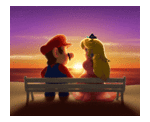
- “Oh Mario! You came to the party to see me! You're so sweet! Thank you!♥”
- —Princess Peach, Paper Mario
Mario, being her most frequent rescuer, is Peach's love interest. The two are shown to have been close friends since childhood in Mario & Luigi: Partners in Time, and the comic "Warios Weihnachtsmärchen," published in the German Club Nintendo magazine, reveals that they spent their graduation ball in school together. Peach has sent Toads to help Luigi when Mario disappears in Luigi's Mansion, and she herself rescues all three of them from Bowser in Super Princess Peach, as well as saving Mario and one of his allies from the Icicle Golem in Mario + Rabbids Kingdom Battle. In Super Mario Bros.: Peach-hime Kyūshutsu Dai Sakusen!, Peach is willing to put herself into a forced marriage with Bowser if it means saving Mario's life. They also share good chemistry together as "buddy players" in Mario Superstar Baseball and Mario Super Sluggers.
Numerous games, alternate media, and supplemental material depict Mario and Peach as having mutual romantic affection for each other as well as a friendship. In Mario Party 5, Peach and Mario are called "Cutest Couple," and the official guide for Mario Party 8 states that Peach is the apple of Mario's eye. In the official guide of Yoshi's Island DS, the description for Baby Mario and Baby Peach: Dynamic Duo mentions the "romantic entanglements" in their adult lives, while the official Mario Kart: Double Dash!! guide reads, "Aw, isn’t that cute? Mario and Peach are together again." In Super Mario RPG: Legend of the Seven Stars, Peach calls Mario her "knight in shining armor," and in the first Paper Mario, one of the Toads tells Mario to take Peach on a date to Shooting Star Summit. In Super Princess Peach, after Peach rescues Mario, she enthusiastically calls and runs towards him and happily dances with him in celebration. Rosalina refers to Peach as Mario's "special one" in Super Mario Galaxy, with the two seen holding hands toward the ending of the game. In Super Mario Galaxy 2, Lubba and two other Lumas refer to Peach as Mario's "special one." Mario Power Tennis even goes as far as showing Mario himself telling Peach of his love for her in Peach's victory scene, which she responds to with a smile and a blown kiss. Also, in Mario's victory scene in Mario Power Tennis, Peach gives him a small kiss on his cheek. Further, in Super Mario Odyssey, after kidnapping her, Bowser declares his intention to make Peach marry him, and Mario's main motivation is to stop Bowser from taking Peach's hand in marriage by force. While Peach does care for Mario, there are times where she gets annoyed if Mario misbehaves. A notable example of this is in the ending to Super Mario Odyssey, where, after Mario attempts to prevent Bowser from getting her hand in marriage by behaving in a similar aggressive manner, she shouts, "Enough!" and storms off in a huff, although she nonetheless calms down enough to tell Mario and Bowser that they should all go back home, and the post-game shows she forgave Mario for the earlier incident.
Peach's obedient servant is Toad, who dotes upon and attempts to protect her despite his fear of Bowser, often getting himself kidnapped along with her in the process. Toad's collectible card from Super Mario Galaxy states that he even formed the Toad Brigade and followed Peach and Bowser to space in order to try to save her, while in numerous other games, he is the one to go alert Mario about Peach's disappearance. They have good chemistry in the Mario Baseball games, and their team names in the Mario Party series include "Royal Family" and "Loyal Friends." In the Super Smash Bros. games, Peach holds Toad in front of herself for protection, though he is shown to be reluctant and attacks out of fear. In Super Smash Bros. Ultimate, however, Toad acts like a proper bodyguard and blocks opponents off from Peach.
Another of Peach's closest friends is Luigi, who often helps Mario rescue her. There has been inconsistencies whenever Luigi is attracted to Peach, as in the platformers, Peach kisses Luigi the same way she kisses Mario, and he reacts the same way. In Mario Power Tennis, when winning a trophy, Peach blows kisses to Mario and Luigi, who both swoon in love. However, individual interaction in other games show that there are no romantic feelings between them. The two share good chemistry in Mario Superstar Baseball but not in its sequel, Mario Super Sluggers.
Peach and Daisy have been shown to be best friends since Daisy first became playable in Mario Tennis for the Nintendo 64. If something involves partners in the Super Mario spin-offs, the two will usually be a team, from various sports games to Mario Kart: Double Dash!!. Mario Super Sluggers is the first game to show the two sharing dialog, wherein Peach reveals that she has concerns for Daisy's welfare. Nintendo's Mario Power Tennis website says that Daisy is Peach's "sister in arms," a term used to describe a close friendship, and while the Prima guides for Mario Kart: Double Dash!! and Mario Kart Wii say that they are cousins, no known first-party material has ever confirmed or denied this. Prior to Daisy's comeback appearance in the games and by extension the establishment of their being best friends, however, a 4-koma segment of the Super Mario-kun manga depicts Peach as being jealous of Daisy receiving attention from Mario to the extent that she throws a mushroom at him out of frustration.
Yoshi is another one of Peach's closest friends, who saved her as a baby alongside the other babies in Yoshi's Island DS. The two share good chemistry is most games, and he has also helped Mario save her in a number of games, including Super Mario 64 DS. He also helps Mario save Peach's friends at her request in Yoshi's Safari.
Peach is on friendly terms with numerous other characters. In the baseball games, she shares good chemistry with Toadette, who is on her starting team, and in Mario Party DS, she gives Toadette a set of touching trumpets. While Peach and Rosalina did not speak in the Super Mario Galaxy games, the two were shown to become fast friends upon meeting in issue 38 of the Super Mario-kun manga, and they were also shown to work together in Super Mario 3D World. While Wario has sometimes shown antagonism towards Peach, such as in Mario Power Tennis, he helps save her in Super Mario 64 DS and is invited to have cake as thanks. He also attempts to retrieve a stolen statue of Peach in Wario Land: Super Mario Land 3 (albeit with the selfish motivation of trying to hold it for ransom to gain his own castle), and he appears to have a crush on her in the Mario & Wario arc of the Super Mario Adventures comic, seeing as he tries to outdo Mario and buy Peach's prize item, a Samus Doll, for her birthday. Furthermore, the comic "Warios Weihnachtsmärchen" reveals that Peach turned Wario down and instead accompanied Mario to their high school graduation ball.
Initially, Peach was unable to get along with her Rabbid counterpart, due to the latter feeling jealousy towards the former's relationship with Mario. Rabbid Peach has tried to get Mario's attention several times and got frustrated when Peach approached them. When Mario and company came to the revamped Mushroom Kingdom, Rabbid Peach looked at Peach with disgust, to the point of touching her dress and then looking away. Peach herself does not show animosity towards her Rabbid counterpart, and she is willing to cooperate with her to stop the Megabug. Although not fond of her counterpart, Rabbid Peach nonetheless has some respect for her, such as placing the Icicle Golem's head in place before stepping aside while making a gesture indicating that the Rabbid's counterpart is free to kick it back into the freezer. After defeating the said villain, Peach constructs a new statue of Rabbid Peach holding a Power Star, much to the latter's delight. Then, Rabbid Peach invites all of her teammates, including Peach, to take a group selfie. Promotional artwork for Mario + Rabbids Kingdom Battle shows Peach and Rabbid Peach taking a selfie together, with the former winking and putting up a V sign.
The opening of Mario & Sonic at the Olympic Winter Games and the story mode for the Nintendo 3DS version of Mario & Sonic at the London 2012 Olympic Games show Peach, alongside Daisy, being great friends with Amy Rose and Blaze the Cat, having a special victory animation with the former in the sequels while sharing a similar rational with the latter.
Foes
- “I'll tell you what: I'll smile if you make everything as it was before you showed up!”
- —Princess Peach, Paper Mario
Bowser has repeatedly kidnapped Peach and invaded her kingdom to rule the world but also as part of his attraction to her. Peach, however, strongly dislikes Bowser for harming her close friends and putting her into distress. She is frightened or apprehensive of Bowser, such as being startled at Mario upon seeing Bowser on his side in Super Mario RPG and sobbing over her captivity in the Super Mario anime movie. Peach discovers his feelings toward her in Paper Mario, but in other games, Peach immediately notices his attraction, such as his attempting to get her to kiss him in public in Mario Power Tennis. When the situation calls for it, however, she will sweet-talk him to persuade him into teaming up with her and Mario in Super Paper Mario, and she occasionally shows him goodwill, such as baking him a thank-you cake at the end of Mario & Luigi: Bowser's Inside Story; she has also hesitated when she had to leave him to his presumed demise in Super Paper Mario.
In Super Paper Mario, Nastasia uses mind control to force Peach to marry the willing Bowser in order to fulfill an ancient prophesy, but while Peach considers the wedding a sham and refuses to acknowledge it, Bowser insists on calling her his wife throughout the game, even as they team up to defeat Count Bleck. Peach also rejected Bowser's advances to marriage in the Super Mario Adventures comic and Super Mario Odyssey.
In Super Mario Sunshine, Bowser had lied to his son that Peach was his mother, and while it was later revealed that Bowser Jr. knew it was a lie all along, he went along with it anyway, and even continued to affectionately refer to her as "mama" in Mario Superstar Baseball. Likewise, Peach, when Bowser Jr. revealed their "relationship" to both Mario and her, expressed shock and confusion at her being his mother.
She also held some animosity towards Mimi, especially after the latter implied that Peach was only good for getting herself kidnapped. This resulted in her being outraged enough at her insult that she insisted on fighting her alone, even snapping at Mario and Luigi to leave before fighting her. Nonetheless, despite her animosity, she risked her life to save Mimi when they were in danger of falling due to the Void's increasing power.
The public
Peach is widely respected in the Mushroom Kingdom and beyond. Her Toads are very loyal, and her citizens adore her. Many people in the Mushroom Kingdom and beyond buy and even collect merchandise of her. In Paper Mario, there is a "Secret Sale" that offers "beautiful photos of Princess Peach", and a Peach doll named Dolly is owned by Goombaria and longed for by Jr. Troopa. In Paper Mario: The Thousand-Year Door, there is a Koopa Troopa Peach fan in Petalburg who collects Peach merchandise, including pictures, photos, and even a life-sized print he keeps at his window, which he claims he would risk life and limb to protect.
Leitmotif
- Main article: Ending (Super Mario Bros.)
Since her debut, Peach has had as her theme a repetitive 4-bar musical theme, with it being expanded in VS. Super Mario Bros., Super Mario Bros.: The Lost Levels, and Super Mario Bros. 3 to feature chimes nearing the end before it loops. The Super Mario Bros.: The Lost Levels version was what Koji Kondo envisioned for the theme originally, but it had to be cut short due to memory limits in the original game.[12] In later games, the music varied between either something akin to Richard Wagner's Bridal Chorus (Paper Mario) or ballet-style music (New Super Mario Bros. series, Paper Mario: Color Splash, and Super Mario Odyssey).
List of game appearances by date
| Title | Role | Original release date | System/format |
|---|---|---|---|
| Super Mario Bros. | Non-playable character | September 13, 1985 | Nintendo Entertainment System |
| VS. Super Mario Bros. | Non-playable character | March 7, 1986 | VS. System |
| Super Mario Bros.: The Lost Levels | Non-playable character | June 3, 1986 | Family Computer Disk System |
| Super Mario Bros. Special | Non-playable character | June 3, 1986 | NEC PC-88, Sharp X1 |
| Super Mario Bros. | Non-playable character | June 25, 1986 | Game & Watch |
| I am a teacher: Super Mario Sweater | Cameo (artwork) | August 27, 1986 | Family Computer Disk System |
| All Night Nippon: Super Mario Bros. | Non-playable character | December 20, 1986 | Family Computer Disk System |
| Super Mario Bros. 2 | Playable character | October, 1988 | Nintendo Entertainment System |
| Super Mario Bros. 3 | Non-playable character | October 28, 1988 | Nintendo Entertainment System |
| Tetris | Non-playable character | November, 1989 | Nintendo Entertainment System |
| Super Mario Bros. | Non-playable character | 1989 | Nelsonic Game Watch |
| Qix | Non-playable character | May 1990 | Game Boy |
| Princess Toadstool's Castle Run | Playable character | September 28, 1990 | Super Mario Bros. Watch |
| Super Mario World | Non-playable character | November 21, 1990 | Super Nintendo Entertainment System |
| Super Mario Bros. Print World | Cameo (artwork) | March 30, 1991 | MS-DOS, Apple II, Tandy 1000, Commodore 64, IBM JX |
| NES Open Tournament Golf | Non-playable character | September 20, 1991 | Nintendo Entertainment System, Nintendo PlayChoice-10 |
| Mario Roulette | Cameo (icon) | 1991 | Arcade |
| Mario Teaches Typing | Non-playable character | March 8, 1992 | MS-DOS, Microsoft Windows, Mac OS, Tandy 1000 |
| Super Mario Bros. & Friends: When I Grow Up | Non-playable character | March 24, 1992 | MS-DOS |
| Super Mario Kart | Playable character | August 27, 1992 | Super Nintendo Entertainment System |
| Yoshi's Cookie | Opponent | November 21, 1992 | Nintendo Entertainment System, Game Boy, Super Nintendo Entertainment System |
| The Legend of Zelda: Link's Awakening | Cameo (in-game poster) | June 6, 1993 | Game Boy |
| Mario is Missing! (CD ROM Deluxe) | Non-playable character | July 1993 | MS-DOS |
| Super Mario All-Stars | Playable character (Super Mario Bros. 2), non-playable in other games | July 14, 1993 | Super Nintendo Entertainment System |
| Yoshi's Safari | Non-playable character | July 14, 1993 | Super Nintendo Entertainment System |
| Mario & Wario | Guidable character | August 27, 1993 | Super Nintendo Entertainment System |
| Mario Undōkai | Non-playable character (Yoshi Race) | August 27, 1993 | Arcade |
| Mario's Early Years! Fun with Letters | Playable character | 1993 | Super Nintendo Entertainment System, MS-DOS |
| Wario Land: Super Mario Land 3 | Cameo (stolen statue) | January 21, 1994 | Game Boy |
| Mario's Early Years! Fun with Numbers | Non-playable character | September 1994 | Super Nintendo Entertainment System, MS-DOS |
| Mario's Early Years! Preschool Fun | Playable character | November 1994 | Super Nintendo Entertainment System, MS-DOS |
| Hotel Mario | Non-playable character | 1994 | Philips CD-i |
| Mario's Game Gallery | Non-playable character | February 23, 1995 | MS-DOS, Microsoft Windows |
| Mario's Tennis | Playable character | July 21, 1995 | Virtual Boy |
| Mario Clash | Non-playable character | September 28, 1995 | Virtual Boy |
| Super Mario RPG: Legend of the Seven Stars | Unlockable playable character (Party Member) | March 9, 1996 | Super Nintendo Entertainment System |
| Kirby Super Star | Cameo (Spring Breeze) | March 21, 1996 | Super Nintendo Entertainment System |
| Super Mario 64 | Non-playable character | June 23, 1996 | Nintendo 64 |
| Mario Teaches Typing 2 | Cameo (title screen) | October 31, 1996 | Microsoft Windows, Mac OS |
| Mario Kart 64 | Playable character | December 14, 1996 | Nintendo 64 |
| Excitebike: Bun Bun Mario Battle Stadium (Ep. 3) | Playable character | 1997 | Satellaview |
| Game & Watch Gallery | Non-playable character | February 1, 1997 | Game Boy |
| Game & Watch Gallery 2 | Playable character | September 27, 1997 | Game Boy |
| The Legend of Zelda: Ocarina of Time | Cameo (in-game photo) | November 23, 1998 | Nintendo 64 |
| The Legend of Zelda: Link's Awakening DX | Cameo (in-game poster) | December 12, 1998 | Game Boy Color |
| Mario Party | Playable character | December 18, 1998 | Nintendo 64 |
| Game & Watch Gallery 3 | Non-playable character | April 8, 1999 | Game Boy Color |
| Mario Golf | Playable character | June 11, 1999 | Nintendo 64 |
| Mario Golf | Non-playable character | August 10, 1999 | Game Boy Color |
| Mario Party 2 | Playable character | December 17, 1999 | Nintendo 64 |
| Mario Tennis | Playable character | July 21, 2000 | Nintendo 64 |
| Paper Mario | Playable character (Peach interludes) | August 11, 2000 | Nintendo 64 |
| Mario Tennis | Playable character | November 1, 2000 | Game Boy Color |
| Mario Party 3 | Playable character | December 7, 2000 | Nintendo 64 |
| Super Mario Advance | Playable character (Super Mario Bros. 2) | March 21, 2001 | Game Boy Advance |
| Mario Kart: Super Circuit | Playable character | July 21, 2001 | Game Boy Advance |
| Luigi's Mansion | Mentioned | September 14, 2001 | Nintendo GameCube |
| Super Smash Bros. Melee | Playable character | November 21, 2001 | Nintendo GameCube |
| Super Mario World: Super Mario Advance 2 | Non-playable character (Super Mario World) | December 14, 2001 | Game Boy Advance |
| Super Mario Sunshine | Non-playable character | July 19, 2002 | Nintendo GameCube |
| Mario Party 4 | Playable character | October 21, 2002 | Nintendo GameCube |
| Game & Watch Gallery 4 | Playable character | October 28, 2002 | Game Boy Advance |
| Nintendo Puzzle Collection | Opponent (Yoshi no Cookie) | February 7, 2003 | Nintendo Gamecube |
| Mario Party-e | Non-playable character (Cast Away Mario!, Mario's Mallet) | February 17, 2003 | Game Boy Advance |
| Super Mario Advance 4: Super Mario Bros. 3 | Non-playable character (Super Mario Bros. 3) | July 11, 2003 | Game Boy Advance |
| Mario Golf: Toadstool Tour | Playable character | July 28, 2003 | Nintendo GameCube |
| Mario Kart: Double Dash!! | Playable character | November 7, 2003 | Nintendo GameCube |
| Mario Party 5 | Playable character | November 10, 2003 | Nintendo GameCube |
| Mario & Luigi: Superstar Saga | Non-playable character | November 17, 2003 | Game Boy Advance |
| Super Mario Fushigi no Janjan Land | Playable character | 2003 | Arcade |
| Mario Golf: Advance Tour | Playable character | April 22, 2004 | Game Boy Advance |
| Paper Mario: The Thousand-Year Door | Playable character (Peach intermissions) | July 22, 2004 | Nintendo GameCube |
| WarioWare: Twisted! | Cameo in microgame | October 14, 2004 | Game Boy Advance |
| Mario Power Tennis | Playable character | October 28, 2004 | Nintendo GameCube |
| Mario Party 6 | Playable character | November 18, 2004 | Nintendo GameCube |
| Super Mario 64 DS | Non-playable character | November 21, 2004 | Nintendo DS |
| Mario Pinball Land | Non-playable character | November 26, 2004 | Game Boy Advance |
| Super Mario Fushigi no Korokoro Party | Playable character | 2005 | Arcade |
| Mario Party Advance | Playable character | January 13, 2005 | Game Boy Advance |
| NBA Street V3 | Playable character | February 8, 2005 | Nintendo Gamecube |
| Yakuman DS | Playable character | March 31, 2005 | Nintendo DS |
| Mario Superstar Baseball | Playable character | July 21, 2005 | Nintendo GameCube |
| Mario Tennis: Power Tour | Playable character | September 13, 2005 | Game Boy Advance |
| Mario Kart Arcade GP | Playable character | October 2005 | Arcade |
| SSX on Tour | Playable character | October 20, 2005 | Nintendo Gamecube |
| Super Princess Peach | Main Protagonist, Playable character | October 20, 2005 | Nintendo DS |
| Mario Party 7 | Playable character | November 7, 2005 | Nintendo GameCube |
| Mario Kart DS | Playable character | November 14, 2005 | Nintendo DS |
| Super Mario Strikers | Playable character | November 18, 2005 | Nintendo GameCube |
| Mario & Luigi: Partners in Time | Non-playable character | November 28, 2005 | Nintendo DS |
| Super Mario Fushigi no Korokoro Party 2 | Playable character | 2006 | Arcade |
| New Super Mario Bros. | Non-playable character | May 15, 2006 | Nintendo DS |
| Mario Hoops 3-on-3 | Playable character | July 27, 2006 | Nintendo DS |
| WarioWare: Smooth Moves | Cameo (Opening Night microgame) | December 2, 2006 | Wii |
| Mario Kart Arcade GP 2 | Playable character | 2007 | Arcade |
| Picross DS | Cameo (Extra Levels) | January 25, 2007 | Nintendo DS |
| Super Paper Mario | Unlockable playable character | April 19, 2007 | Wii |
| Mario Strikers Charged | Playable character | May 25, 2007 | Wii |
| Mario Party 8 | Playable character | May 29, 2007 | Wii |
| Itadaki Street DS | Playable character | June 21, 2007 | Nintendo DS |
| Super Mario Galaxy | Non-playable character | November 1, 2007 | Wii |
| Mario & Sonic at the Olympic Games | Playable character | November 6, 2007 | Wii |
| Mario Party DS | Playable character | November 8, 2007 | Nintendo DS |
| Mario & Sonic at the Olympic Games | Playable character | January 17, 2008 | Nintendo DS |
| Super Smash Bros. Brawl | Playable character | January 31, 2008 | Wii |
| Mario Kart Wii | Playable character | April 10, 2008 | Wii |
| Mario Super Sluggers | Playable character (unlockable in Challenge Mode) | June 19, 2008 | Wii |
| Kirby Super Star Ultra | Cameo (Spring Breeze) | September 22, 2008 | Nintendo DS |
| New Play Control! Mario Power Tennis | Playable character | January 15, 2009 | Wii |
| Mario & Luigi: Bowser's Inside Story | Non-playable character | February 14, 2009 | Nintendo DS |
| Mario & Sonic at the Olympic Winter Games | Playable character | October 13, 2009 | Wii |
| Mario & Sonic at the Olympic Winter Games | Playable character | October 13, 2009 | Nintendo DS |
| Mario Party Fushigi no Korokoro Catcher | Playable character | 2009 | Arcade |
| New Super Mario Bros. Wii | Non-playable character | November 12, 2009 | Wii |
| Super Mario Galaxy 2 | Non-playable character | May 23, 2010 | Wii |
| Mario Sports Mix | Playable character | November 25, 2010 | Wii |
| Pushmo | Cameo (Nintendo Murals) | October 5, 2011 | Nintendo 3DS |
| Super Mario 3D Land | Non-playable character | November 3, 2011 | Nintendo 3DS |
| Mario & Sonic at the London 2012 Olympic Games | Playable character | November 15, 2011 | Wii |
| Fortune Street | Unlockable playable character | December 1, 2011 | Wii |
| Mario Kart 7 | Playable character | December 1, 2011 | Nintendo 3DS |
| StreetPass Mii Plaza | Cameo (Puzzle Swap) | 2012 | Nintendo 3DS |
| Mario & Sonic at the London 2012 Olympic Games | Playable character (Girls Group Events) | February 9, 2012 | Nintendo 3DS |
| Mario Party 9 | Playable character | March 2, 2012 | Wii |
| Mario Tennis Open | Playable character | May 20, 2012 | Nintendo 3DS |
| New Super Mario Bros. 2 | Non-playable character | July 28, 2012 | Nintendo 3DS |
| Paper Mario: Sticker Star | Non-playable character | November 11, 2012 | Nintendo 3DS |
| Scribblenauts: Unlimited | Non-playable character | November 13, 2012 | Wii U |
| New Super Mario Bros. U | Non-playable character | November 18, 2012 | Wii U |
| Mario Party Whirling Carnival | Playable character | 2012 | Arcade |
| Mario & Luigi: Dream Team | Non-playable character | July 12, 2013 | Nintendo 3DS |
| Mario Kart Arcade GP DX | Playable character | July 2013 | Arcade |
| Mario & Sonic at the Sochi 2014 Olympic Winter Games | Playable character | November 8, 2013 | Wii U |
| Super Mario 3D World | Playable character | November 21, 2013 | Wii U |
| Mario Party: Island Tour | Playable character | November 22, 2013 | Nintendo 3DS |
| NES Remix 2 | Playable character | April 24, 2014 | Wii U |
| Mario Golf: World Tour | Playable character | May 1, 2014 | Nintendo 3DS |
| Mario Kart 8 | Playable character | May 29, 2014 | Wii U |
| Pushmo World | Cameo (Nintendo Murals) | October 5, 2011 | Nintendo 3DS |
| Super Smash Bros. for Nintendo 3DS | Playable character | September 13, 2014 | Nintendo 3DS |
| Ultimate NES Remix | Playable character | November 7, 2014 | Wii U |
| Captain Toad: Treasure Tracker | Non-playable character | November 13, 2014 | Wii U |
| Super Smash Bros. for Wii U | Playable character | November 21, 2014 | Wii U |
| Nintendo Badge Arcade | Badges | December 17, 2014 | Nintendo 3DS |
| Ace Combat Assault Horizon Legacy+ | Cameo (amiibo fighter jet decal) | January 29, 2015 | Nintendo 3DS |
| Mario Party 10 | Playable character | March 12, 2015 | Wii U |
| Puzzle & Dragons: Super Mario Bros. Edition | Unlockable playable character | April 29, 2015 | Nintendo 3DS |
| Stretchmo | Cameo (Papa Blox's NES Expo) | May 13, 2015 | Nintendo 3DS |
| Super Mario Maker | Costume Mario transformation, Non-playable character | September 10, 2015 | Wii U |
| Picross 3D: Round 2 | Cameo (amiibo puzzle) | October 1, 2015 | Nintendo 3DS |
| Mario Tennis: Ultra Smash | Playable character | November 20, 2015 | Wii U |
| Mario & Luigi: Paper Jam | Non-playable character | December 3, 2015 | Nintendo 3DS |
| Mario & Sonic at the Rio 2016 Olympic Games Arcade Edition | Playable character | February 2016 | Arcade |
| Mario & Sonic at the Rio 2016 Olympic Games | Playable character (Golf, 100m Freestyle Swimming) | February 18, 2016 | Nintendo 3DS |
| Minecraft: Wii U Edition (Patch 5) | Playable skin in the Super Mario Mash-up | May 17, 2016 | Wii U |
| Mario & Sonic at the Rio 2016 Olympic Games | Playable character | June 23, 2016 | Wii U |
| Paper Mario: Color Splash | Non-playable character | October 7, 2016 | Wii U |
| Mario Party: Star Rush | Playable character | October 7, 2016 | Nintendo 3DS |
| Swapdoodle | Cameo (artwork) | November 17, 2016 | Nintendo 3DS |
| Super Mario Maker for Nintendo 3DS | Non-playable character | December 1, 2016 | Nintendo 3DS |
| Super Mario Run | Unlockable playable character | December 15, 2016 | iOS, Android |
| Miitomo | Cameo (artwork) | 2016 | iOS, Android |
| Mario Sports Superstars | Playable character | March 10, 2017 | Nintendo 3DS |
| Mario Kart 8 Deluxe | Playable character | April 28, 2017 | Nintendo Switch |
| Minecraft: Nintendo Switch Edition | Playable skin in the Super Mario Mash-up | May 11, 2017 | Nintendo Switch |
| Hey! Pikmin | Cameo (amiibo treasure) | July 13, 2017 | Nintendo 3DS |
| Mario + Rabbids Kingdom Battle | Unlockable playable character | August 29, 2017 | Nintendo Switch |
| Mario & Luigi: Superstar Saga + Bowser's Minions | Non-playable character | October 5, 2017 | Nintendo 3DS |
| Super Mario Odyssey | Non-playable character | October 27, 2017 | Nintendo Switch |
| Mario Party: The Top 100 | Playable character | November 10, 2017 | Nintendo 3DS |
| Minecraft: New Nintendo 3DS Edition (version 1.5.25) | Playable skin in the Super Mario Mash-up | June 5, 2018 | Nintendo 3DS |
| Minecraft | Playable skin in the Super Mario Mash-up | June 21, 2018 | Nintendo Switch |
| Mario Tennis Aces | Playable character | June 22, 2018 | Nintendo Switch |
| WarioWare: Gold | Cameo (amiibo Tap, Wario's amiibo Sketch) | June 22, 2018 | Nintendo 3DS |
| Super Mario Party | Playable character | October 5, 2018 | Nintendo Switch |
| Luigi's Mansion | Mentioned | October 12, 2018 | Nintendo 3DS |
| Super Smash Bros. Ultimate | Unlockable playable character | December 7, 2018 | Nintendo Switch |
| Mario & Luigi: Bowser's Inside Story + Bowser Jr.'s Journey | Non-playable character | December 27, 2018 | Nintendo 3DS |
| New Super Mario Bros. U Deluxe | Non-playable character | January 11, 2019 | Nintendo Switch |
| Super Mario Maker 2 | Non-playable character | June 28, 2019 | Nintendo Switch |
| Dr. Mario World | Unlockable playable character | July 9, 2019 | iOS, Android |
| The Legend of Zelda: Link's Awakening | Cameo (in-game poster) | September 20, 2019 | Nintendo Switch |
| Mario Kart Tour | Unlockable playable character | September 25, 2019 | iOS, Android |
| Luigi's Mansion 3 | Non-playable character | October 31, 2019 | Nintendo Switch |
| Mario & Sonic at the Olympic Games Tokyo 2020 | Playable character | November 1, 2019 | Nintendo Switch |
| Mario & Sonic at the Olympic Games Tokyo 2020 - Arcade Edition | Playable character | January 23, 2020 | Arcade |
| Paper Mario: The Origami King | Non-playable character | July 17, 2020 | Nintendo Switch |
| Tetris 99 | Cameo (15th, 20th, 28th and 33rd Maximus Cups) | July 31, 2020 | Nintendo Switch |
| Super Mario 3D All-Stars | Non-playable character | September 18, 2020 | Nintendo Switch |
| Super Mario 3D World + Bowser's Fury | Playable character (Super Mario 3D World) | February 12, 2021 | Nintendo Switch |
| Mario Golf: Super Rush | Playable character | June 25, 2021 | Nintendo Switch |
| Mario Party Superstars | Playable character | October 29, 2021 | Nintendo Switch |
| Mario Kart Live: Home Circuit (version 2.0.0) | Playable character (Relay Mode) | November 17, 2021 | Nintendo Switch |
| Mario Strikers: Battle League | Playable character | June 10, 2022 | Nintendo Switch |
| Mario + Rabbids Sparks of Hope | Playable character | October 20, 2022 | Nintendo Switch |
| Super Mario Bros. Wonder | Playable character | October 20, 2023 | Nintendo Switch |
| Super Mario RPG | Unlockable playable character (Party Member) | November 17, 2023 | Nintendo Switch |
| Princess Peach: Showtime! | Main Protagonist, Playable character | March 22, 2024 | Nintendo Switch |
| Paper Mario: The Thousand-Year Door | Playable character (Peach intermissions) | May 23, 2024 | Nintendo Switch |
| Super Mario Party Jamboree | Playable character | October 17, 2024 | Nintendo Switch |
| Mario & Luigi: Brothership | Non-playable character | November 7, 2024 | Nintendo Switch |
Profiles and statistics
- Main article: List of Princess Peach profiles and statistics
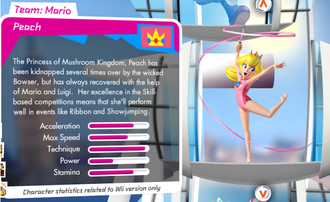
Princess Peach's bios typically describe her as the ruler of the Mushroom Kingdom and the Toads, as well as mentioning her tendency to get kidnapped by Bowser. In most Super Mario sports games, she is classed as a Technique type character, and in the Mario Kart series, she is classed as either a lightweight or middleweight character. Her emblem is her crown.
Portrayals
The following voice actresses have portrayed Princess Peach during the course of Super Mario franchise history:
English
- Jeannie Elias - The Super Mario Bros. Super Show!
- Tracey Moore - The Adventures of Super Mario Bros. 3, Super Mario World
- Kathy Fitzgerald - Mario is Missing!
- Jocelyn Benford - Hotel Mario
- Leslie Swan - Super Mario 64, Mario Kart 64 (international), Super Mario 64 DS, Super Paper Mario
- Asako Kozuki - Mario Kart 64 (Japanese), Mario Party, Mario Party 2, Mario Kart: Super Circuit
- Jen Taylor - Mario Golf to Mario Kart DS, as well as Mario Hoops 3-on-3 and Mario & Sonic at the Olympic Games, although her voice clips are sometimes used together with Samantha Kelly's, such as in Mario Sports Superstars and Mario Tennis Aces.
- Nicole Mills - Super Mario Strikers, Mario & Luigi: Partners in Time; her voice clips from Super Mario Strikers are partially reused in Mario Strikers Charged along with those provided by Samantha Kelly.
- Samantha Kelly (often abbreviated as Sam Kelly in the game credits) - Most Super Mario-related media as of Mario Strikers Charged, Mario Party 8, and Super Mario Galaxy
- Anya Taylor-Joy - The Super Mario Bros. Movie (English)
Other languages
Mami Yamase, a pop singer, voiced Peach in Super Mario Bros.: Peach-hime Kyūshutsu Dai Sakusen!, marking the first time the character was given an official voice.
In the foreign-language dubs of the DIC cartoons, Peach was dubbed by the following actresses:
- Latin American Spanish: María Fernanda Morales (Super Show!), Dulce María Romay (Super Mario Bros. 3), and Rocío Robledo (Super Mario World)
- Castilian Spanish: Pilar Santigosa
- French: Super Show! - Stéphanie Murat (original), Virginie Ledieu (redub); Super Mario Bros. 3 and Super Mario World - Isabelle Volpé
- German: Sabine Bohlmann
- Italian: Alessandra Karpoff
- Brazilian Portuguese: Guilene Conte (main), Eleonora Prado (alternate portrayer in Super Mario Bros. 3)
- European Portuguese: Ana Vieira, Flora Mirona, and Márcia Menezes
- Swedish: Louise Raeder (Super Show!), Nina Gunke (Super Mario Bros. 3, Super Mario World)
- Hungarian: Fazekas Zsuzsa (first voice), Solecki Janka (Super Mario World and redubs)
- Finnish: Liisa Paatso
- Russian: Olga Golovanova (Super Mario Bros. 3), Daria Frolova (Super Mario World)
- Romanian: Oana Avram (Super Mario Bros. 3, Super Mario World)
Gallery
- For this subject's image gallery, see Gallery:Princess Peach.
Quotes
- Main article: List of Princess Peach quotes
- "Thank you, Mario!"
- General quote used whenever rescued from Bowser or another enemy in a game
- "Mario, you're my knight in shining armor!"
- When rescued from Booster in Super Mario RPG: Legend of the Seven Stars.
- "Mario, be careful! I have a bad feeling about this..."
- When spoken to on the Delfino Airstrip in Super Mario Sunshine.
- "Stay out of this! I am a princess, and she has thrown mud at my dignity! You two leave me be! UNDERSTOOD?!"
- Commanding Mario and Luigi to let her fight Mimi on her own in Super Paper Mario.
- "Oh, did I win?"
- Victory quote in the Super Smash Bros. series.
- "My travels with Tiara were wonderful - so many memories! And I realized something...how important it is to see different things and talk with different people, that no matter what kingdom you're in, people smile with the same sparkle! We have to do what we can with our time to smiles on as many faces as possible! So I've decided to invite people from all around the world to the castle!"
- When encountered in the Mushroom Kingdom in the postgame of Super Mario Odyssey.
Audio samples
| File info |
| File info |
| File info |
| File info |
| File info |
| File info |
Names in other languages
- Main article: List of Princess Peach names in other languages
| Language | Name | Meaning | Notes |
|---|---|---|---|
| Japanese | ピーチ Pīchi-hime |
Princess Peach | |
| Albanian | Princeshë Këpurdhë[16] | Princess Toadstool | Super Mario World television series |
| Arabic | الأميرة الضفدع[17] Al-amirh Aldfd'e |
Princess Toadstool | DIC cartoons |
| Catalan | Princesa Peach[?] | Princess Peach | The Super Mario Bros. Movie |
| Chinese (simplified) | 碧姬公主[18] Bìjī Gōngzhǔ |
Princess Peach | |
| 桃花公主[?] Táohuā Gōngzhǔ |
Princess Peach Flower | iQue localization, before December 23, 2022 | |
| Chinese (traditional) | 碧琪公主[19] Bìqí Gōngzhǔ |
Princess Peach | Before New Super Mario Bros. Wii |
| 碧姬公主[?] Bìjī Gōngzhǔ |
Princess Peach; "姬" also means "Princess" by itself. | ||
| Czech | Princezna Peach[?] | Princess Peach | |
| Danish | Prinsesse Peach[?] | Princess Peach | |
| Prinsesse Slørhat[20] | Princess Cortinarius | The Adventures of Super Mario Bros. 3 | |
| Prinsesse Toadstool[21] | Princess Toadstool | The Super Mario Bros. Super Show! | |
| Dutch | Prinses Peach[?] | Princess Peach | |
| Prinses Paddestoel[22][23] | Princess Mushrump | Super Mario Bros. and Super Mario Bros. 2 | |
| Finnish | Prinsessa Peach[?] | Princess Peach | |
| Prinsessa Kanttarelli[?] | Princess Chanterelle | Super Mario Bros. | |
| Prinsessa Toadstool[24] | Princess Toadstool | DIC cartoons | |
| Prinsessa Kultakutri[?] | Princess Goldilocks | Super Mario World, Super Mario 64 | |
| French | Princesse Peach[?] | Princess Peach | |
| Princesse[?] | Princess | older games | |
| Princesse Toadstool[?] | Princess Toadstool | ||
| Princesse Champignon[25][26] | Princess Mushroom | Super Mario Bros. 2, Nintendo Comics System | |
| German | Prinzessin Peach[?] | Princess Peach | |
| Prinzessin Toadstool[27] | Princess Toadstool | DIC cartoons | |
| Greek | Πριγκίπισσα Πίτς[?] Prigipissa Pits |
Princess Peach | |
| Πριγκίπισσα Τόουντστουλ[28] Pringípissa Tóuntstul |
Princess Toadstool | DIC cartoons | |
| Hebrew | 'הנסיכה פיץ[?] Hansikha Pich |
Princess Peach | |
| Hungarian | Peach hercegnő[?] | Princess Peach | |
| Italian | Principessa Peach[?] | Princess Peach | |
| Principessa Amarena[29] | Princess Cherry | DIC cartoons | |
| Principessa Toadstool[?] | Princess Toadstool | NES Super Mario Bros. instruction booklet | |
| Korean | 피치 공주[?] Pichi Gongju |
Princess Peach | |
| Norwegian | Prinsesse Peach[?] | Princess Peach | |
| Prinsesse Fluesopp[30] | Princess Fly Agaric | DIC cartoons | |
| Polish | Księżniczka Peach[?] | Princess Peach | |
| Portuguese | Princesa Peach[?] | Princess Peach | |
| Princesa Cogumelo[31] | Princess Toadstool | DIC cartoons | |
| Romanian | Peach[?] | - | The Super Mario Bros. Movie |
| Prințesa Piersicuță[?] | Princess Peach; piersicuță is a diminutive form of piersică ("peach"). | McDonald's Romania 2013 Happy Meal promotion | |
| Prințesa Ciupercuță[32] | Princess Toadstool; ciupercuță is a diminutive form of ciupercă ("mushroom"). | DIC cartoons | |
| Russian | Принцесса Пич[?] Printsessa Pich |
Princess Peach | |
| Принцесса Поганка[33] Printsessa Poganka |
Princess Toadstool | DIC cartoons | |
| Spanish (NOA) | Princesa Peach[?] | Princess Peach | games and The Super Mario Bros. Movie |
| Princesa Seta[34] | Princess Mushroom | DIC cartoons | |
| Spanish (NOE) | Princesa Peach[?] | Princess Peach | games and The Super Mario Bros. Movie |
| Princesa Sapolina[35] | Princess Sapolina (from sapo, meaning "toad") | DIC cartoons | |
| Swedish | Prinsessan Peach[?] | Princess Peach | |
| Prinsessan Flugsvamp[36] | Princess Fly Agaric | DIC cartoons | |
| Thai | เจ้าหญิงพีช[37] Chao-ying Phich |
Princess Peach |
Trivia
- Toadstool is described as a "fairy Princess" in the 47th issue of the United Kingdom Nintendo Magazine System.[38]
- Peach was misnamed as "Princess Daisy" in the 49th issue of the Australian Nintendo Magazine System.[39]
References
- ^ "Yours truly- - Princess Toadstool (Peach)" - Peach's letter in Super Mario 64 (Note: parentheses indicate a disjunct between "Peach" and the rest of the text, originally represented by a different color, font, and angle in the letter.)
- ^ a b "Today, in the Mushroom Kingdom, it was discovered that Princess Peach Toadstool's castle is standing empty with no sign of the missing inhabitants." – 1996. Super Mario 64 Player's Guide. Nintendo of America (American English). Page 4.
- ^ "Officially known as Princess Peach Toadstool, our little monarch has a long history with Mario." – Young, Jason (August 21, 2000). Mario Tennis Prima's Official Strategy Guide. Prima Games (American English). ISBN 0-7615-3133-5. Page 21.
- ^ Iwata Asks | 4. My First Project: Draw a Rug | Iwata Asks: Nintendo DSi | Nintendo. Nintendo of Europe (British English). Retrieved May 19, 2024. (Archived via archive.today.)
- ^ Iwata Asks. Volume 8 - Flipnote Studio - An Animation Class. Nintendo of UK. Archived May 25, 2012, 10:11:51 UTC from the original via archive.today. Retrieved May 19, 2024.
- ^ February 2010. "Shigeru Miyamoto on the origin of the names of Mario and his friends". Nintendo DREAM (jp). Retrieved May 19, 2024. Note: The Japanese word for pink (桃色, momoiro) literally means "peach-colored."
- ^ Gaming Historian (September 30, 2021). How the Mario Characters Got Their Names (08:02). YouTube. Retrieved May 19, 2024.
- ^ a b Super Mario Bros.: Peach-hime Kyūshutsu Dai Sakusen! pamphlet
- ^ Supper Mario Broth. The booklet included with the official soundtrack for the 1986 anime movie "Super Mario Bros.: The Great Mission to Rescue Princess Peach!" lists Mario's, Luigi's and Peach's intended heights, weights and ages at the time of the movie's release. Of course, due to the many redesigns the characters have had in the decades since, these statistics are no longer reflective of Nintendo's current portrayal of the characters.". Tumblr. Retrieved November 14, 2023.
- ^ "Chronologically, a seventeen-year-old..." – Adventures of Super Mario Bros. 3 writer's bible.
- ^ "In the early stages, we contemplated the idea that Rosalina was related to Peach, so that is why their features are very similar. Her long bangs represent her outward strength and inner sorrow and loneliness." – Black, Fletcher (November 9, 2007). Super Mario Galaxy PRIMA Official Game Guide (Premiere Edition). Prima Games (American English). Page 346.
- ^ Koji Kondo – 2001 Composer Interview. Schmuplations. Retrieved December 12, 2018.
- ^ Super Mario Bros. instruction booklet (pdf). Nintendo (jp). Page 4. Retrieved December 24, 2024.
- ^ Super Mario Bros. Famicom 40th Anniversary site. Nintendo (jp). Retrieved December 24, 2024.
- ^ Super Mario Bros.: Peach-hime Kyūshutsu Dai Sakusen!
- ^ Bota e Super Marios - Episoda 8 | Linja telefonike festive (Dublimi Shqip, Çufo)
- ^ سوبر ماريو - سبيس تون
- ^ 部分角色的中文名稱變更通知. Nintendo HK. Retrieved December 23, 2022. (Archived December 23, 2022, 13:54:26 UTC via Wayback Machine.)
- ^ Traditional Chinese title for Super Princess Peach (超級碧琪公主 Chāojí Bìqí Gōngzhǔ, Super Princess Peach). nintendo.tw. Archived January 9, 2013, 03:45:30 UTC from the original via Wayback Machine. Retrieved January 25, 2022.
- ^ Super Mario Bros. 3 Never Koop a koopa (Dansk)
- ^ The Super Mario Bros. Super Show! (EP1 - Dansk - Den nærsynede fugl)
- ^ Club Nintendo (Netherlands) No. 2. Page 4.
- ^ Club Nintendo (Netherlands) Classic. Page 30.
- ^ Super Mario Bros 1 VHS (Suomi)
- ^ French manual of Super Mario Bros. 2. Page 8.
- ^ «La douce et gentille Princesse Champignon appela au secours.» – 1992. Super Mario Bros. n° 1. Comics USA / Glénat (French). ISBN 978-2-87695-184-6. Page 3.
- ^ The Super Mario Bros Super Show! Folge 1 Sauberkeit ist alles / Der Vogel! Der Vogel!
- ^ Super Mario World - Episode 8 - Gopher Bash Greek Audio
- ^ Super Mario bros super show ita 1x01 Vola!Vola!
- ^ The Super Mario Bros Super Show S01E01 - The Bird! The Bird!/Neatness Counts (Norsk Fox Kids)
- ^ Super Mario Bros. Super Show! - Apresentação Conta / O Pássaro, O Pássaro! (Alta Qualidade)
- ^ May 20, 2015. "Princess Toadstool for President", dubbed in Romanian by KidsCo. Odnoklassniki (OK.ru). Retrieved January 4, 2016.
- ^ Приключения братьев Супер Марио 3 (все серии) (6+)
- ^ Super Mario Brothers Super Show in Spanish / En Español- ¡El pájaro! ¡El pájaro! - Episode 1
- ^ Super Mario Bros. 3 - La princesa Sapolina para presidente (Doblaje castellano original)
- ^ Super Mario Bros Super Show - Episode 1 - Swedish
- ^ UIP Thailand (November 30, 2022). Thai version of the official trailer for The Super Mario Bros. Movie. YouTube. Retrieved December 9, 2022.
- ^ "During his quest, Mario joins forces with a cloud who thinks he’s a tadpole, an animated doll, the King of the Koopas and a fairy Princess!" – August 1996. Nintendo Magazine System (UK) Issue 47. Page 90.
- ^ April 1997. Nintendo Magazine System (AU) Issue #49. Page 39.
- Humans
- Parents
- Princesses
- Magicians
- Pirates
- Captains
- Police officers
- Doctors
- Playable characters
- Main characters
- Allies
- Amiibo tap: Nintendo's Greatest Bits
- Brain Drain characters
- Double Trouble characters
- Dr. Mario World
- Excitebike: Bun Bun Mario Battle characters
- Fortune Street characters
- Heads-Up
- Hotel Mario
- Itadaki Street DS characters
- Leaping Lizards characters
- LEGO Super Mario characters
- Mario + Rabbids Kingdom Battle characters
- Mario + Rabbids Sparks of Hope characters
- Mario & Luigi: Bowser's Inside Story characters
- Mario & Luigi: Bowser's Inside Story + Bowser Jr.'s Journey characters
- Mario & Luigi: Brothership characters
- Mario & Luigi: Dream Team characters
- Mario & Luigi: Paper Jam characters
- Mario & Luigi: Partners in Time characters
- Mario & Luigi: Superstar Saga characters
- Mario & Luigi: Superstar Saga + Bowser's Minions characters
- Mario & Wario
- Mario & Sonic at the London 2012 Olympic Games characters
- Mario & Sonic at the Olympic Games characters
- Mario & Sonic at the Olympic Games Tokyo 2020 characters
- Mario & Sonic at the Olympic Winter Games characters
- Mario & Sonic at the Rio 2016 Olympic Games characters
- Mario & Sonic at the Sochi 2014 Olympic Winter Games characters
- Mario Clash
- Mario Golf (Nintendo 64) characters
- Mario Golf (Game Boy Color) characters
- Mario Golf: Advance Tour characters
- Mario Golf: Super Rush characters
- Mario Golf: Toadstool Tour characters
- Mario Golf: World Tour characters
- Mario Hoops 3-on-3 playable characters
- Mario is Missing! characters
- Mario Kart 64 characters
- Mario Kart 7 characters
- Mario Kart 8 characters
- Mario Kart Arcade GP characters
- Mario Kart Arcade GP 2 characters
- Mario Kart Arcade GP DX characters
- Mario Kart Arcade GP VR
- Mario Kart: Double Dash!! characters
- Mario Kart DS characters
- Mario Kart Tour characters
- Mario Kart: Super Circuit characters
- Mario Kart Wii characters
- Mario Kart Wii trading cards
- Mario Party characters
- Mario Party 2 characters
- Mario Party 3 characters
- Mario Party 4 characters
- Mario Party 5 characters
- Mario Party 6 characters
- Mario Party 7 characters
- Mario Party 8 characters
- Mario Party 9 characters
- Mario Party 10 characters
- Mario Party Advance characters
- Mario Party DS characters
- Mario Party-e characters
- Mario Party: Island Tour characters
- Mario Party: Star Rush characters
- Mario Party Superstars characters
- Mario Party: The Top 100 characters
- Mario Pinball Land
- Mario Power Tennis characters
- Mario Sports Mix characters
- Mario Sports Superstars characters
- Mario Strikers: Battle League characters
- Mario Strikers Charged characters
- Mario Super Sluggers playable characters
- Mario Superstar Baseball characters
- Mario Tennis (Nintendo 64) characters
- Mario Tennis Aces characters
- Mario Tennis (Game Boy Color) characters
- Mario Tennis Open characters
- Mario Tennis: Power Tour characters
- Mario Tennis: Ultra Smash characters
- Mario's Tennis characters
- Married characters
- Mobile Golf characters
- NES Open Tournament Golf characters
- New Super Mario Bros. characters
- New Super Mario Bros. 2 characters
- New Super Mario Bros. U characters
- New Super Mario Bros. Wii characters
- New Super Mario Bros. Wii trading cards
- Paper Mario characters
- Paper Mario: Color Splash characters
- Paper Mario: Sticker Star characters
- Paper Mario: The Origami King characters
- Paper Mario: The Thousand-Year Door characters
- Paper Mario series party members
- Parasol Fall
- Pipe Down! characters
- Princess Peach: Showtime! characters
- Super Mario 3D Land characters
- Super Mario 3D World characters
- Super Mario 64 characters
- Super Mario amiibo line
- Super Mario Bros.
- Super Mario Bros. 2
- Super Mario Bros. 3
- Super Mario Bros. Deluxe
- Super Mario Bros.: Peach-hime Kyūshutsu Dai Sakusen!
- Super Mario Bros. Special
- Super Mario Bros.: The Lost Levels
- Super Mario Bros. Wonder characters
- Super Mario Galaxy characters
- Super Mario Galaxy 2 characters
- Super Mario Galaxy trading cards
- Super Mario Kart characters
- Super Mario-kun characters
- Super Mario Maker characters
- Super Mario Maker costumes
- Super Mario Maker 2 characters
- Super Mario Odyssey characters
- Super Mario Party characters
- Super Mario Party Jamboree characters
- Super Mario RPG: Legend of the Seven Stars characters
- Super Mario Run characters
- Super Mario Strikers characters
- Super Mario Sunshine characters
- Super Mario World characters
- Super Mario World (television series)
- Super Paper Mario characters
- Super Paper Mario trading cards
- Super Princess Peach
- Super Smash Bros. amiibo line
- Super Smash Bros. Brawl fighters
- Super Smash Bros. Brawl stickers
- Super Smash Bros. Brawl trophies
- Super Smash Bros. for Nintendo 3DS / Wii U fighters
- Super Smash Bros. for Nintendo 3DS trophies
- Super Smash Bros. for Wii U trophies
- Super Smash Bros. Melee fighters
- Super Smash Bros. Melee trophies
- Super Smash Bros. Ultimate fighters
- Super Smash Bros. Ultimate spirits
- The Adventures of Super Mario Bros. 3 characters
- The Super Mario Bros. Movie characters
- The Super Mario Bros. Super Show! characters
- Unjust Desserts characters
- UNO Super Mario
- Wrecking Crew '98
- Yakuman DS
- Yoshi's Safari
